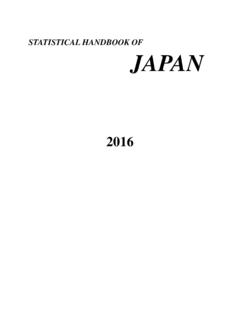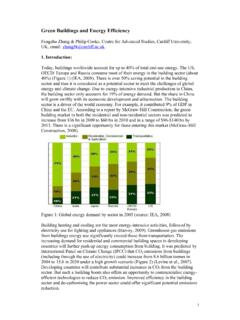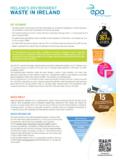Transcription of Future of Tax
1 Future of Tax Submissions Background Paper N u te rourou, N ku te rourou, ka ora ai te iwi With your contribution and mine, the people will prosper Published on 14 March 2018 by the Tax Working Group, New Zealand. Crown CopyrightThis work is licensed under the Creative Commons Attribution International licence. In essence, you are free to copy, distribute and adapt the work, as long as you attribute the work to the Crown (Tax Working Group, New Zealand) and abide by the other licence terms. To view a copy of this licence, visit Please note that no departmental or governmental emblem, logo or Coat of Arms may be used in any way which infringes any provision of the Flags, Emblems, and Names Protection Act 1981. Attribution to the Crown (Tax Working Group, New Zealand) should be in written form and not by reproduction of any such emblem, logo or Coat of : 978-1-98-853495-4 (Online)The URL at 14 March 2018 for this paper is.
2 Of Tax Submissions Background PaperContentsExecutive Summary 31 Introduction 82 The Future environment 9 Changing demographics the aging population and fiscal pressures 10Te ao M ori and the Future 11 The changing nature of work 12 Technological change and its impact on tax bases 12 Opportunities for tax administration and policy from technological change 13 Company tax pressures 13 Environmental challenges 14 Concern about inequality 15 Changing patterns of globalisation 153 Purposes and principles of a good tax system 16 What are taxes? 16 Taxes and wellbeing 17 Distribution and equity 19 Efficiency and other impacts of tax 20 Tax incidence 214 The current New Zealand tax system 22 How much does New Zealand tax? 22 What does New Zealand tax?
3 232 Future of Tax Submissions Background Paper5 The results of the current tax system 27 Individual income tax 27 Company income tax 28 Goods and services tax 29 Cash transfers and income tax paid 30 Wealth inequality 36 Average tax wedge 39 Tax on household savings 39 The environment 40 Charities 41 Administration 416 Thinking outside the current system 43 Other taxes 43 International tax 44 Base erosion and profit shifting (BEPS) 44 The digital economy 44 Hypothecating tax revenue 457 Specific challenges 46 Housing affordability 47 Capital gains tax 48 Land tax 48 Progressive company tax 49 The tax system and positive environmental outcomes 49 GST exemptions for particular goods 50 Glossary 51 Appendix 1 Tax Working Group Terms of Reference 53 Appendix 2 Design issues with a capital gains tax 55 Appendix 3 Questions for submitters 563 Future of Tax Submissions Background PaperExecutive SummaryNei r ka tau mai r te ao hurihuri nei; he hau mai tawhiti, he tohu raukura n ng t puna.
4 In Te Tiriti o Waitangi tonu! He tauira, k kiritia te kaupapa nei! Rau rangatira m . N u! N ku! Kia ora ai t tou. T n koutou. T n t tou! Kia ora t tou katoa!As the changing world swirls about us, we muster wisdoms from our pasts to help, helping us to forge ahead in a new world. Bearing the raukura plume of our forebears, and the dignity of Te Tiriti o Waitangi, we can address, grapple with, and overcome this challenge!Greetings all! We invite you to contribute and to participate knowing that from everyone s efforts, new paths are found. Our greetings, and our acknowledgments to ora tatou katoa!The tax system matters to everybody Few areas of public policy contribute as much to the welfare of New Zealanders as taxation. Taxes allow the Government to fund the vital public services such as healthcare, education, justice, expenditure on healthy ecosystems, and defence that underpin our living standards.
5 The calculation and payment of tax also imposes obligations on New Zealanders and the tax system affects different groups of people in different ways. As a consequence, tax is not just for experts all New Zealanders have a stake in the design of our tax the Tax Working Group The Government has established the Tax Working Group (the Group) to examine further improvements to the structure, fairness, and balance of the tax system. The Group has also been directed to apply a particular focus on the Future to its work, with a view to exploring the major challenges, risks, and opportunities facing the tax system over the next decade and of Tax Submissions Background PaperWe want to hear your viewsThis paper calls for public submissions on a range of issues that the Group considers important to its work.
6 Public submissions will inform the Group s consideration of proposals for improving the tax system. The Group will provide an interim report on these proposals to the Ministers of Finance and Revenue in September 2018. There will be further opportunities for public comment following the publication of that interim report. In the spirit of openness and inclusion, the Group would now like to encourage all New Zealanders to share their own views about what is working and what is not in the current tax , risks, and opportunitiesTax systems have always had to evolve alongside changing practices in business, technology, and society. However, technology today particularly in the area of digital communications is having a radical impact on the way businesses operate, both within and across national this context, the Group has identified eight broad challenges, risks, and opportunities that will affect the tax system over the coming decade and beyond: changing demographics, particularly the aging population and the fiscal pressures that will bring; te ao M ori and the role of the M ori economy in lifting New Zealand s overall living standards; the changing nature of work; technological change and the different business models that will bring; falling company tax rates around the world.
7 Environmental challenges, including climate change and loss of ecosystem services and species; growing concern about inequality; and the impacts of globalisation and changes in its tax system will need to be sufficiently robust to deal with these challenges, and sufficiently nimble to take advantage of the opportunities. There will also be other shocks and surprises that we have not considered and cannot Group would therefore like to hear your views on how these challenges and opportunities might affect the tax system, and, equally importantly, whether you consider there are any other key issues that policymakers will need to prepare purposes and principles of a good tax systemEven as the tax system evolves in response to these risks and opportunities, it will still need to fulfil the central purpose of tax policy: to provide sufficient revenue to the Government to fund the provision of public goods, services, and transfers.
8 But the design of the tax system will also have broader impacts on the wellbeing of New Zealanders across the social, economic, and environmental dimensions. The Group intends to be mindful of these impacts as it develops recommendations for reform. In recognition of the broad basis of wellbeing, the Treasury uses the Living Standards Framework to incorporate a more comprehensive range of factors into its analysis. The Living Standards Framework identifies four capital stocks that are crucial to intergenerational wellbeing: Financial and physical capital, such as roads, factories, and financial assets. Human capital, such as skills and knowledge. Social capital, such as trust, cultural achievements and community connections.
9 Natural capital, such as soil and Living Standards Framework encourages us to consider how policy change is likely to impact each of the four capitals, and broadens our assessment beyond strictly economic of Tax Submissions Background PaperThe established criteria that have been used in past tax reviews (both domestically and overseas) are also useful when considering the costs and benefits of various reforms: Efficiency: minimise impediments to economic growth and avoid distortions (biases) to the use of resources. Equity and fairness: achieve fairness including through horizontal equity (the same treatment for people in the same circumstances) and vertical equity (higher tax obligations on those with greater economic capacity to pay).
10 Procedural fairness is also important for a tax system. Revenue integrity: minimise opportunities for tax avoidance and arbitrage. Fiscal adequacy: raise sufficient revenue for the Government s requirements. Compliance and administration costs: minimise the costs of compliance and administration, and give taxpayers as much certainty as possible. Coherence: ensure that individual reform options make sense in the context of the entire tax you read this paper, the Group would encourage you to consider which principles and frameworks are most important to you in evaluating the tax system, and to test your own ideas and proposals against design of the current tax systemNew Zealand currently has a broad-based, low-rate tax system.







